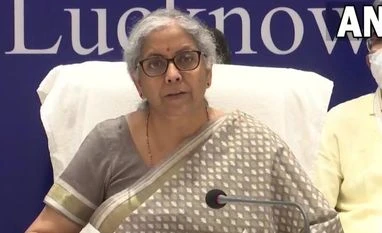The all-powerful GST Council on Friday decided to charge food delivery platforms such as Swiggy and Zomato a tax even as it extended concessional tax rates on certain COVID-19 drugs by three months till December 31, said Union Finance Minister Nirmala Sitharaman.
The Council, which comprises Sitharaman and her state counterparts, decided to continue keeping petrol and diesel out of the GST purview as subsuming the current excise duty and VAT into one national rate would impact revenues.
Sitharaman said 5 per cent GST will be levied at the point where the delivery is made by Swiggy and Zomato.
"Regarding Swiggy-like operators, it has been decided that since the place where food is delivered will be the point where tax is collected, the Swiggy-like operator who will be collecting tax will pay up the GST on it," said Sitharaman in Lucknow.
Briefing reporters on the decisions taken by the Council at a meeting after the conclusion of the Council's 45th meeting, and the first in a physical format after start of the Covid-19 pandemic, she said GST has been exempted on muscular atrophy drugs like Zolgensma and Viltepso, which cost crores of rupees.
It extended the period of concessional GST rates on certain COVID-related drugs by three months till December 31 but decided not to give the same benefit to medical equipment. Tax rate on Amphotericin B, Tocilizumab was cut to 'Nil', while Remdesivir and Heparin was reduced to 5 per cent in June 2021, which has now been extended till December 31, 2021 from the present September 30.
"We have seen in the last one year and probably earlier that some life-saving drugs, which are not connected with Corona and are very expensive. Exemptions have been given for such drugs. I am giving the names of two because those two are very expensive drugs - Zolgensma and Viltepso. These two are very important drugs which cost something like Rs 16 crore. So the council has decided to grant exemption from GST for these two. Drugs that are suggested by the Ministry of Health for treating muscular atrophy, on the recommendation of Health Ministry and Dept of Pharmaceuticals, are also exempted for IGST on import for personal use," said Sitharaman.
The concessional regime for certain medical equipment will end on September 30.
Also, the Council cut GST rate from 12 per cent to 5 per cent on cancer-related rugs and on fortified rice kernels to 5 per cent from 18 per cent.
GST rate on bio-diesel for blending in diesel was reduced to 5 per cent from 12 per cent, while the national permit fee for goods carriage has been exempt from GST.
Import of leased aircraft have also been exempted from payment of I-GST, the finance minister said.
"GST Council felt it was not the right time to include petroleum products in GST," she said.
The panel decided to levy 18 per cent GST on all sorts of pens. Specified renewable sector devices will be charged 12 per cent tax.
GST Council also recommended new footwear and textile rates from January 1.
FM Sitharaman said a group of state ministers (GoM) will look at rate rationalisation related issues, make recommendations in 2 months.
GST payable on import of aircraft or other goods imported on lease shall now be exempted from double taxation.
Transport of export goods by vessels and air was exempt from GST till September 30. This exemption was given because of difficulties being faced by exporters in getting a refund of ITC (Input Tax Credit) due to technical issues on GST portal. This exemption is being extended by 1 more year, said FM.
Here are a few decisions taken by GST Council:
1) Pens to attract single GST rate of 18%, 12% GST on specified renewable sector devices.
2) GST Council cuts tax rates on medicines used in cancer treatment from 12% to 5%
3) GST rate on biodiesel for blending with diesel cut from 12% to 5%
4) GST Council exempts national permit fee charged by states for operation of goods carriage
5) GST Council agrees to correct inverted duty structure on footwear and textiles from Jan 1, 2022
6) GST on retro-fitment kits for vehicles used by divyang or persons with disabilities reduced to 5%
7) GST rate on fortified rice kernels which can be used in schemes like Integrated Child Development Services Scheme has been reduced from 18% to 5%.
8) Training programmes wholly funded by state/Centre Govt exempt from GST
9) GST Council also has granted exemptions to many life-saving drugs used to treat children
Unlock 30+ premium stories daily hand-picked by our editors, across devices on browser and app.
Pick your 5 favourite companies, get a daily email with all news updates on them.
Full access to our intuitive epaper - clip, save, share articles from any device; newspaper archives from 2006.
Preferential invites to Business Standard events.
Curated newsletters on markets, personal finance, policy & politics, start-ups, technology, and more.
)